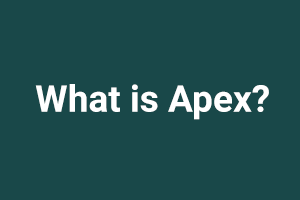Apex is a strongly typed, object-oriented programming language similar to JAVA that allows programmers to execute their code on Salesforce servers including API calls. It uses syntax that appears like Java and acts like database stored procedures. It enables programmers to implement logic to most system events which include button clicks, related record updates, and Visualforce pages. Its codes are often initiated by Web service requests, from triggers on objects, LWC, and aura components.
As a language, Apex is:
Integrated:
It provides built-in support for common Lightning Platform idioms, including:
- Data manipulation language (DML) calls, like INSERT, UPDATE, and DELETE, which include DmlException handling.
- Inline Salesforce Object Query Language (SOQL) to query records of an object and Salesforce Object Search Language (SOSL) queries that return lists of sObject records.
- Looping that permits for bulk processing of multiple records at a time
- Locking syntaxes that prevent record update conflicts while execution.
- Custom public API calls will be built from stored Apex methods
- Warnings and errors are issued when a user tries to edit or delete a custom object or field that’s referenced by Apex
Easy to use:
Apex is predicated on familiar Java idioms, like variable and expression syntax, block and conditional statement syntax, loop syntax, object, and array notation. Where it introduces new elements, it uses syntax and semantics that are easy to know and encourage efficient use of the Lightning Platform. Therefore, it produces code that’s both succinct and straightforward to write down.
Data focused:
Apex is meant to string together multiple queries and DML statements into one unit of labor on the Salesforce server. Developers use database stored procedures to string together multiple transaction statements on a database server in a similar way.
Rigorous:
Apex is a strongly typed language that uses the direct reference to schema objects like object and field names. It fails quickly at compile time if any references are not valid. It stores all custom field, object, and sophistication dependencies in metadata to make sure that they’re not deleted while required by active Apex code.
Hosted:
Apex is interpreted, executed, and controlled entirely by the Lightning Platform.
Multi Tenant aware
Like the remainder of the Lightning Platform, Apex runs during a multitenant environment. So, the Apex runtime engine is supposed to guard closely against runaway code, preventing it from monopolizing shared resources. If any code violates the limits system will throw easy-to-understand error messages.
Easy to test:
Apex provides built-in support for unit test creation and execution. It includes test results that indicate what proportion code is roofed, and which parts of your code might be more efficient. Salesforce ensures that each one custom Apex code works needless to say by executing all unit tests before any platform upgrades.
Versioned:
You can save your Apex code against different versions of the API. This enables you to maintain behavior.
Apex is included in Performance Edition, Unlimited Edition, Developer Edition, Enterprise Edition, and Database.com.
People having good command over the French language can get a French certification from StudySection. StudySection offers both beginner level and expert level French Certification Exams to test the ability to communicate in the French language.




